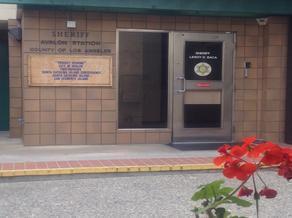Two separate crimes caused the Avalon falconry program a temporary setback this week. First someone stole the falconer’s equipment and then someone injured one of his birds.
The hawk has a reported 50 percent chance of surviving.
However, about half of the equipment was recovered and the falcon master has another bird he can bring to Catalina Island.
Two separate crimes caused the Avalon falconry program a temporary setback this week. First someone stole the falconer’s equipment and then someone injured one of his birds.
The hawk has a reported 50 percent chance of surviving.
However, about half of the equipment was recovered and the falcon master has another bird he can bring to Catalina Island.
“On June 24th, Avalon deputies arrested two juveniles for their involvement in the theft of property from the falconer’s vehicle as well as their involvement in other reported thefts,” said Capt. Doug Fetteroll, commander of the Avalon Sheriff’s Station. “They were cooperative with investigators and some of the stolen property has been recovered.”
“The owner of the injured falcon has not filed a police report. Rest assured, if there is an allegation of animal abuse a criminal investigation will be initiated and every attempt will be made to identify the suspects. Part of our job is to not only protect the people in our community, but to protect animals as well,” Fetteroll said.
Rocky Post, master falconer of On The Wing, which has a contract with the city of Avalon to use falcons to encourage pest birds to relocate, said he had not reported the federally protected Harris hawk’s injury to law enforcement because he was focused on getting the bird treated.
Post said a veterinarian gave the bird a 50-50 chance of survival.
One of his other birds screeched in the background during his telephone interview.
All in all, the past week has not been kind to the hawk, Post, or the city’s falconry program.
The problems began Sunday evening, June 23, when someone stole Falconry equipment from Post’s car. Post said the items weren’t covered by his automobile insurance and it would cost him $7,500 out of pocket to replace the equipment.
But “miraculously,” he said, about half the equipment reappeared very close to the site of the theft.
“It’s stuff that only I would find valuable,” Post said.
He said he thought that the property was stolen as a result of pressure from the community. However, he said that was speculation.
He also said that a camera, binoculars and five falcon hoods were still out there.
“I got enough stuff back to continue to work,” Post said.
“The glass is half full,” he said.
Unfortunately, the same day his equipment was returned, his Harris falcon was deliberately injured.
Post was flying the bird and did not witness the crime. According to Post, when the bird landed, someone dangled a hook with fish on it in front of the bird. Post said that Harris falcons don’t eat fish. “If you dangle something in front of them, they will go after it,” Post said.
The bird swallowed the hook.
Post found the bird at the end of a fishing line that was attached to a fishing pole.
Post said that as he cut the line and gathered up the bird, he heard someone say, “Did you get enough for YouTube?”
However, Post, who has a degree in clinical psychology and has evaluated young people as a clinical psychologist, said he did not believe this was a premeditated act.
He pointed out that the person responsible could not have known he would be flying the bird in the area. Post said whoever did it was someone with “poor impulse control”who made a bad decision.
According to Post, a veterinarian has said that the hook has gone too far down the hawk’s throat to be removed. The bird has been given a 50-50 chance of survival.
Post was particularly upset because the Harris falcon was the one primarily responsible for reducing the number of unwanted birds in the area. “This is the one who has gone to bat for the city,” Post said. “That’s done.”
Post said he will never fly that bird again.
He said he hadn’t reported the bird’s injury to the authorities because he was dealing with getting the bird treated.
“This is the chance I take every day with these guys,” Post said, meaning the birds.
The dangers to the birds are usually electrocution on a power line or hitting a window.
“With the kind of work I do, the birds are in harm’s way,” Post said.
The falconry program was initiated last year by then-City Manager Steve Hoefs.
According to an October 2012 staff report, the falcons don’t kill pest birds. Instead, the presence of predator birds causes the undesirable birds to relocate.
As previously reported in the Islander, Hoefs initiated the program to reduce the waste deposited in Avalon Bay by unwanted birds and improve the quality of water.Interim City Manager Denise Radde said the falconry program has helped the city, as well as the work done on the sewer, to improve water quality.
She said fewer notices have been posted on the beaches.
“All the work we have done is starting to pay off,” Radde said.
She said she had seen different numbers on how many pest birds had been sent away by the falconry program, but she said, “You can definitely see the difference.”









